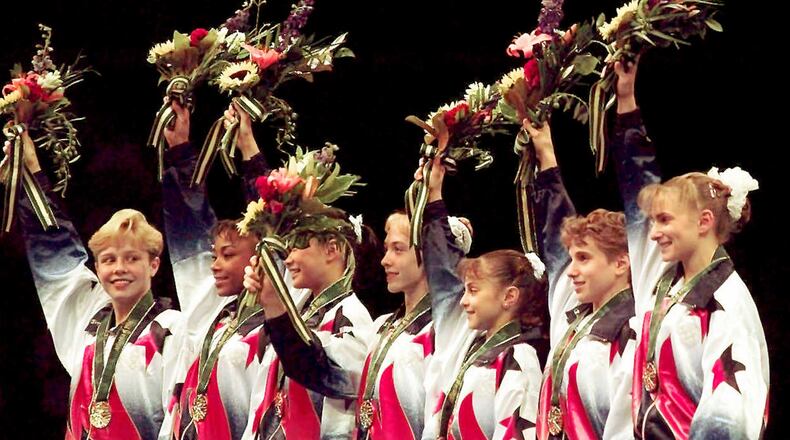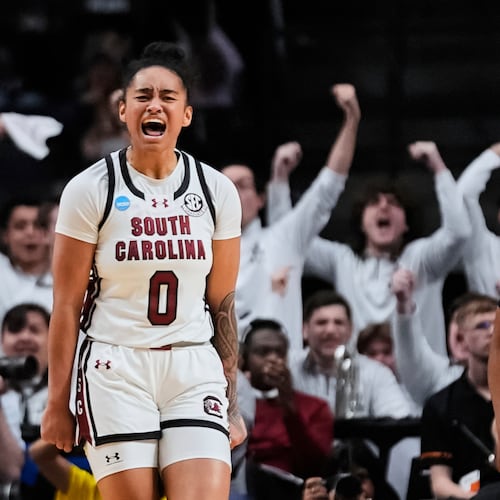Editor’s Note: This story was published in the Atlanta Journal-Constitution on Wednesday, July 24, 1996, as U.S. women — The Magnificent Seven — made history in Atlanta. This is a daily take of the events that transpired on the 25th anniversary of the Games in Atlanta.
Ripe for the hype, they were already The Magnificent Seven before anyone ever lit a torch. Tuesday night, the U.S. women’s gymnastics team, and America itself, learned how real life can exceed any nickname.
In a historic first, the U.S. won the Olympic team title with a breathless rush through the Georgia Dome that seemed to last just a few short minutes and then lasted forever. Leading by a comfortable .821 points in the final moments, waiting for only one last successful vault to pull the night off, the crowd giggled through two pratfalls by Dominique Moceanu.
Next came Kerri Strug, the last American to perform, and she promptly chilled the crowd of 30,048 by butt-dropping her first attempt. What the hall could not know was that she’d also badly twisted her ankle, introducing perhaps the most poignant moment in this sport’s history in America. Strug limped down the runway, threw a strong Yurchenko one-and-a- half vault, held her landing on pin-point, extended her arms for the judges and then collapsed in pain, nesting on her right leg.
Credit: AJC
Credit: AJC
Carried from the hall by her coach, Bela Karolyi, Strug never saw the score flashed at the foot of the vault: 9.712. It was over. The U.S. (389.255) won handily ahead of Russia (388.404) and Romania (388.246). China was fourth and Ukraine fifth. Magnificent, indeed.
“Personally,” said Shannon Miller, “I’m so excited, I can’t even say.”
Strug rejoined the team on the podium to receive the gold medal and X-rays later taken at Crawford Long Hospital were negative. Whether she will be able to compete in the all-around competition Thursday will be determined.
Third in the 1992 Olympics, second in 1984, Americans had only won team medals twice when competing with Soviet-trained gymnasts. This time they overran Russia in the night’s first rotation on uneven bars and then eluded defending world champion Romania, which finally showed the strain of competing one woman short due to injury.
Opening the night .127 points behind the Russians, the U.S. was propelled to a hot start by Jaycie Phelps, whose 9.787 in the team’s first routine on uneven bars established sudden momentum. By the time all seven women performed (high score went to Dominique Dawes’ 9.850), the Russians had not only lost first place but had lost a remarkable .599 points in just one event.
Credit: Allsport
Credit: Allsport
Said Russia coach Leonid Arkaev, “We met here maybe the best American team I’ve ever seen.”
Though U.S. scoring ran consistently high — the winning point total was the lowest in the last four Olympics — Russia and Romania did enough to damage their own chances. The Romanians, third after compulsories, performed a shaky balance beam rotation at the start and never countered. The Russians suffered a fall by Elena Dolgopolva in the uneven bars before Oksana Liapina fell during her floor exercise, while the U.S., at least until the last vaults, clinked like a metronome on each event. The verdict was clear enough to Russian star Svetlana Chorkina that she was choking back tears after the third rotation.
Yet when it was down to a last vault and Strug assured her coaches she could complete it, history will not reflect that first place was already all but assured. (Said Peggy Liddick, Miller’s coach, “The Russians would have to score a 10.8 floor routine to win.”)
“We didn’t exactly know if we won the gold medal,” captain Amanda Borden said. “Even after the vault, we kept asking, ‘Are you sure? Are you sure?’ "
Ask Kerri Strug, who was so sure, it hurt.
Day 4: Russian male gymnasts continue dominance | Day 6: Dream Team changes game
About the Author
Keep Reading
The Latest
Featured




